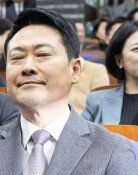Govt, ruling party should take initiative in labor reform
Govt, ruling party should take initiative in labor reform
Posted September. 13, 2015 19:42,
Giving up to pursuing the agreement with the labor groups, the government has officially announced that it would solely seek the legislation process for labor reform. The labor reform is the task of our times that can no longer be put off said the government at a joint briefing among Deputy Prime Minister Choi Kyoung-hwan, Employment and Labor Minister Lee Ki-kweon and Trade, Industry and Energy Minister Yoon Sang-jick, explaining that it would push ahead with the required procedure for labor reform legislation from early next week such as consultation between the government ant the ruling party. Convening a consultation with the government next Monday and general meeting of lawmakers next Wednesday, the Saenuri Party has decided to propose the labor reform-related bills as official party platform.
The labor reform is a difficult agenda to be agreed upon in the Economic and Social Development Commission, as two different stakeholders of labor group and the management are involved in the first place. Reaching an agreement on the principle and direction for structural improvement of the labor market in December 2014, the Commission had sought to strike a deal for matters with high priority until last March to no avail. The deadline for the agreement, which is September 10, is set by the government, not by the commission, commission chairman Kim Dae-hwan complained. However, theres no more time left to wait for non-binding commission to resolve the issue. Now, it is imperative that the government and the ruling party take the initiative in the matter and push forward with legislation process by discussing with the opposition party.
The salary peak system and criteria and procedure for impartial dismissal of maladjusted employees should be part of the labor reform, Deputy Prime Minister Choi Kyoung-hwan said. Improving flexibility in employment and enhancing social safety net are at the core of labor reform discussion. Still, the Federation of Korean Trade Unions and the Korean Confederation of Trade Unions, which represent no more than 10 percent of the entire employees, have adamantly opposed to general dismissal for flexible labor market and changes of employment regulations, dragging down the Economic and Social Development Commission.
The National Tax Services data on the National Assemblys audit shows that the criteria of annual salary for those in the top 5 percent of income level was 85 million won (approx. 71,864 U.S. dollars) before tax. The annual salary of high income labor members of the both Unions is well over 85 million won, meaning that they are far from being the economical weak. The reality is that the unemployed youth, those who are about to graduate from colleges and workers from small and medium-sized companies and non-regular workers are hurt by the high income and "iron rice bowl" employment that they enjoy. At the survey conducted by the Federation of Korean Industries of 1,746 students from Pusan National University, Kyungpook National University, Chonnam National University and Chungnam National University, 89 percent responded that companies should be allowed to dismiss their employees with low performance, demonstrating their cold attitude toward labor aristocrats of the both unions.
The government is advised to hand in the bills for the labor reform by consulting with the ruling party so as not to miss golden time. If theres any delay for the legislation due to different stances between the ruling and the opposition parties, the government should immediately amend enforcement ordinance. The opposition party with the determining say in legislation based on the so-called National Assembly Advancement Act would also have to face harsh judgment of the nation if it only has a regard for feelings of labor groups, dragging down the reform.







